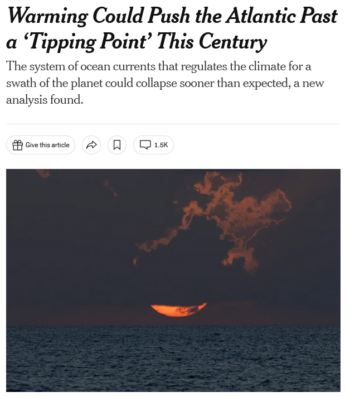Humans Might Be About to Break the Ocean? Don't Stop the Presses
Julie Hollar

When a new peer-reviewed study (Nature Communications, 7/25/23) announces that a crucial Atlantic Ocean circulation system, a cornerstone of the global climate, may collapse as quickly as two years from now, you'd think news outlets might want to put that on the front page.
The AMOC (Atlantic Meridional Overturning Circulation) moves warmer water from the tropics to the North Atlantic, where it cools, sinks and returns down the US East Coast. Its collapse would be a "climate tipping point" with, as the British Guardian (7/25/23) explained,
disastrous consequences around the world, severely disrupting the rains that billions of people depend on for food in India, South America and West Africa. It would increase storms and drop temperatures in Europe, and lead to a rising sea level on the eastern coast of North America. It would also further endanger the Amazon rainforest and Antarctic ice sheets.
The study, published by an open-access affiliate of the prestigious scientific journal Nature, used new statistical methods, rather than new observations, to make its prediction, which contradicts the IPCC's latest assessment. The IPCC (6/14/19) deemed a full collapse this century "very unlikely," but it relied on data that only went back to 2004. The new study, the Guardian reported, "used sea surface temperature data stretching back to 1870 as a proxy for the change in strength of AMOC currents over time." The study projected the collapse of the ocean system between 2025 and 2095, with 2050 the most likely date, without sharp reductions in global carbon emissions.
Some climate scientists are cautious about the new study, suggesting that more observational data is needed to say the collapse could happen so imminently (Grist, 7/26/23). But as climate scientist Jonathan Foley argued (Twitter, 7/27/23), though the study doesn't offer certainty, the consequences are so dire that "the only prudent reaction to this is to work to address climate change, as quickly as possible, to avoid these kinds of impacts."
"I really wish that journalists and editors took this as seriously as scientists do, and reported it loudly and accurately, taking the time to get the facts right," Foley wrote. "The planet is in trouble, and we need to have the best possible information."
Unfortunately for the planet and those who inhabit it, corporate media would rather look the other way, at worst, and offer scary clickbait headlines with few connections to actionable policy at best.
'Try all that we can'
 What the Wall Street Journal (7/25/23) was reporting instead.
At the Washington Post, editors put the news on page 12 (7/26/23). That's nearly the same place it put news of the last dire report about the AMOC two years ago (8/6/21), which didn't put a timeline on the collapse, but suggested it was much closer to a tipping point than previously expected. In the Post's 2021 report, the study author was quoted: "It's one of those events that should not happen, and we should try all that we can to reduce greenhouse gas emissions as quickly as possible." Yet the lack of urgency evinced by news media make that kind of swift and dramatic action next to impossible.
The Wall Street Journal, the favored newspaper of the business crowd, didn't even bother to cover the report, despite the massive economic implications of an AMOC collapse. It did, however, find room on its front page that day for a story headlined "The Manpri Summer: How Men's Shorts Got So Long."
NPR (7/27/23) focused more on the importance of the timing of the collapse than on the collapse itself, under the headline "Why It's So Important to Figure Out When a Vital Atlantic Ocean Current Might Collapse." The article presented the story as primarily a debate over the timing of the collapse, with the upshot being that "crucial tipping points in the climate system are incredibly hard to predict." NPR applied the term "urgent" twice to the idea of doing more climate research, with "rapid action to limit how much the planet warms" added the second time, almost as an afterthought.
'Plausible we've fallen off a cliff'
 The New York Times (7/26/23) was the only leading paper to put the AMOC study on its front page—though not in the top right corner reserved for the most important story of the day; that was "Legacy Admission at Harvard Faces Federal Inquiry" (7/26/23).
The New York Times (7/26/23) was one of the only major outlets to put the news on its front page, with a well-reported piece by Raymond Zhong. It also did better than many, mentioning "human-driven warming" in the second paragraph, and paraphrasing a scientist that "uncertainty about the timing of an AMOC collapse shouldn’t be taken as an excuse for not reducing greenhouse-gas emissions to try to avoid it." That scientist, Hali Kilbourne, was given the last word:
“It is very plausible that we’ve fallen off a cliff already and don’t know it,” Dr. Kilbourne said. “I fear, honestly, that by the time any of this is settled science, it’s way too late to act.”
Yet even here, no connections were made to concrete policy options, and no policy experts or activists were quoted to offer them.
The only other front-page US newspaper mention FAIR could find in the Nexis database was in the Charleston Post & Courier (7/25/23), which similarly made no connections to policy.
In the context of a summer of extreme climate events, including unprecedented heatwaves, ocean temperatures and wildfires, we desperately need a media system that treats the climate crisis like the five-alarm fire that it is, and demands accountability from the politicians and industries—not least the fossil fuel industry—driving us off the cliff.
Featured Image: The Guardian's depiction (7/25/23) of the AMOC system.
|
